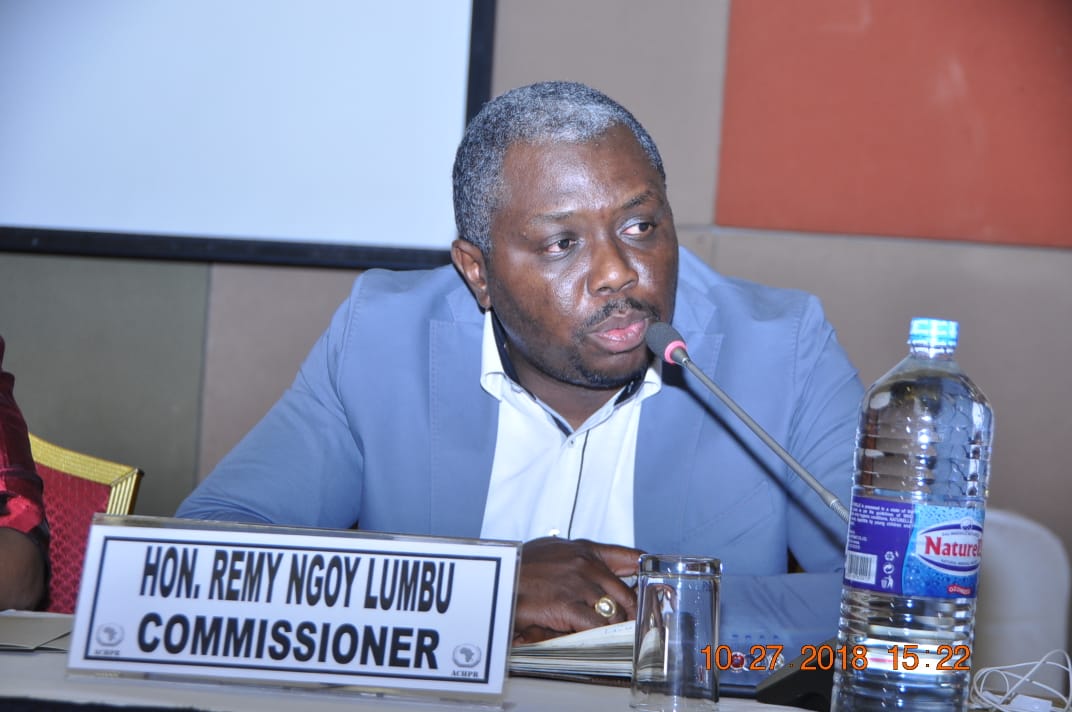During the 63rd session of the African Commission, two high-level panels were organised to celebrate these instruments.
On 25 October 2018, during the panel on ‘the 70th anniversary of the Universal Declaration on Human Rights and the state of play in Africa’, panellists discussed the accomplishments in the realisation of these rights as well as the remaining challenges governments face in guaranteeing these rights. The discussions eventually led to reflecting on the way forward. What more can be done to make sure that human rights are protected for all Africans in the next 70 years? Panellists included Commissioner Maya Fadel and UN Special Rapporteur on freedom of assembly and association Clément Voule.
The panellists noted the importance of the preamble of the declaration, especially that all people, all nations, all individuals must enjoy the rights included in the Declaration. Where are we today?
Throughout the panel, it becomes clear that populations in Africa are still prevented from fully enjoying human rights. Some countries are still going through large political changes. Violence is omnipresent in some parts of Africa, making it close to impossible to guarantee the right to food. States still struggle especially regarding the full accomplishment of social and economic rights.
Commissioner Maya Fadel emphasised the specificity of the African regional system. Although the African Charter includes and recognises all the rights guaranteed in the Declaration, it also retains the African culture and values through the guarantee of these rights.
The next day, on 26 October, during the ‘Panel on Twenty Years of the UN Declaration on Human Rights Defenders (1998-2018) and Five Years of Resolution 68/181 on Women Human Rights Defenders (2013-2018): Achievements and Way Forward,’ panellists discussed the continued struggle of defenders in Africa, especially women human rights defenders but also the steps taken by some countries to overcome this situation and provide a better working environment for defenders. Panellists included Commissioner Remy Ngoy Lumbu, Commissioner Lucy Asuagbor and representative of the human rights State Secretary Office of Côte d’Ivoire.
Commissioner Ngoy Lumbu seised the opportunity to launch a compendium on the legal protection of human rights defenders. He worked in collaboration with the University of Pretoria to create this tool compiling all legal instruments relevant to the protection of defenders. This compendium, which includes ISHR’s model law on the promotion and protection of human rights defenders, is the perfect tool to popularise these instruments with defenders so they are the first informed of the protection they are afforded in international, regional and sometimes national laws.
Commissioner Asuagbor, who is also the African Commission Special Rapporteur on the rights of women, highlighted the challenges women face when defending human rights, in particular those of women. What does their community think of them when they work on specific rights such as sexual minorities, corruption or extractive industries? Women rights often affect faith beliefs, which causes women to be stigmatised and discriminated for standing up for their rights. This reason alone justifies the need for a specific protection when talking about the risks women face.
The government of Côte d’Ivoire then presented the progress made in the country through the adoption of a national law. Indeed, “a nation seeking to be emergent can only be so by including the protection of human rights at its core and ensuring the protection of its defenders,” a representative of the government said. The law, which was adopted 5 years ago, must be evaluated and adapted to the realities on the ground.
Finally, the representative of the Organisation Internationale de la Francophonie (OIF) presented the major practices of the organisation to work towards a better protection of defenders as follow:
- Diplomacy, discreet and constant but effective
- Civil society capacity building – the OIF finances a number of defenders’ activities around the world
- Mobilisation of institutional networks of the Francophonie
To conclude, Voule recognised that the preoccupation on the situation of defenders is now global and that over the years we note an improvement in the recognition of their work. However, work remains to be done over the next twenty years to guarantee their safety.
Contact: Africa Advocacy Consultant, Etong Kame Adélaïde, [email protected]
Photo: IMLU/Independent Medico Legal Unit




